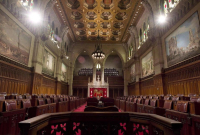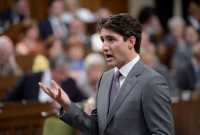Support strong Canadian climate journalism for 2025
A bid by senators to amend the Trudeau government's budget escalated Wednesday into a test of wills over which parliamentary chamber — the elected House of Commons or the appointed Senate — has the right to decide budgetary matters.
Senators were incensed after the government summarily and swiftly rejected Senate amendments to its budget implementation bill, sending a message back to the upper house that the changes "infringe upon the rights and privileges" of the Commons.
The message echoed Prime Minister Justin Trudeau's contention that the elected chamber has the sole authority and legitimacy to decide budgetary matters.
The message was sent, without debate and with unanimous approval of MPs from all parties in the Commons, less than three hours after the Senate gave final approval to an amended version of the budget bill, deleting provisions that would impose a so-called escalator tax on booze.
Senators must now decide whether to insist upon their amendments or defer to the will of the elected chamber. But they were so insulted by the assertion that they don't have the right to amend budget bills that they almost unanimously refused to even consider the message later Wednesday, putting it off until Thursday and potentially disrupting MPs' summer break.
In the end, even the government representative in the Senate, Peter Harder, voted against his own motion to immediately consider the Commons' message, which went down to defeat by a vote of 79-2, with five abstentions.
The Commons adjourned a short time later until Sept. 18. But if the Senate were to insist Thursday on its amendments to the budget bill, MPs would have to be recalled to respond, assuming that the government doesn't want to leave the bill in limbo until the fall.
Conservative senators, independent Liberal senators and independent senators — including those who actually support the budget bill — were in agreement that the government went too far in questioning the Senate's constitutional right to amend budget bills.
"By doing that, they are just trying to rub our nose into it and they can't expect that we're going to say yes to that," said independent Liberal Sen. Serge Joyal, an acknowledged constitutional expert.
He accused the government of trying to indirectly amend the Constitution — which prohibits the Senate from initiating a money bill but does not prevent it from amending or even defeating one — to limit the Senate's powers.
Conservative Sen. Leo Housakos said the government "didn't show much respect for the parliamentary system" by questioning the Senate's right to amend a budget bill.
Independent Sen. Andre Pratte, who had already signalled his intention to defer to the elected chamber on the budget bill despite concerns about some provisions, said the message sent from the Commons "makes us want to reaffirm in principle our right to amend budget bills."
He said the various groups in the Senate are working on two separate motions to be voted on Thursday: one informing the Commons that senators will not insist on their amendments to the budget bill and another reasserting the Senate's constitutional power to amend a budget bill.
Had the government not challenged the Senate's right to amend but simply rejected its amendments to the bill, Sen. Joe Day, leader the Liberals in the Senate, said the upper house likely would have bowed to the will of the Commons and everyone could have gone home for the summer Wednesday evening.
"We had our bags all packed and ready to go," said Day, who had earlier in the day urged senators not to shy away from exercising their right to amend the bill.
Whether the message will prompt senators to dig in their heels on their amendments to the budget bill remains to be seen. But it can't have helped in a chamber where opposition to the budget already appeared to run deep.
While the Senate's final approval of the amended bill was done by a simple voice vote Wednesday, senators voted 46-32 late Tuesday to accept the recommendation of the Senate's finance committee to delete the provisions that would allow the government to automatically increase the federal excise tax on wine, beer and spirits every year by the rate of inflation.
All 34 Conservative senators in the chamber, three independents and nine independent Liberal senators voted in favour of the committee report.
During final debate Wednesday, senators variously referred to the escalator tax as "a tax grab," a tax hike "in perpetuity" and "taxation without representation." They worried that it would devastate small breweries and wineries and that it sets a dangerous precedent, allowing the government to hike taxes annually without having to get parliamentary approval each year.
Objections were also raised about the structure of the new infrastructure bank and the provisions allowing the government to borrow money without getting parliamentary approval.
Although Conservative MPs made no objection to the message the Commons sent to the Senate, they repeatedly pressed Trudeau earlier Wednesday to accept the senators' amendments.
Conservative Leader Andrew Scheer, a former Speaker of the Commons, blamed Trudeau's "Liberal senators" for the impasse with the Senate, referring to the senators Trudeau kicked out of the Liberal caucus three years ago, as well as the independent senators he's appointed since becoming prime minister.
He ignored the central role Conservative senators — who make up the single largest group in the Senate, continue to sit in the national Tory caucus and generally vote as a block — played in amending the budget.





Comments